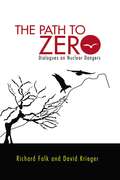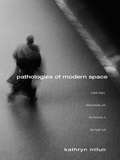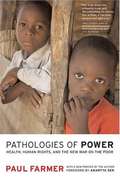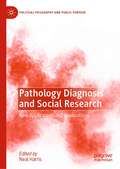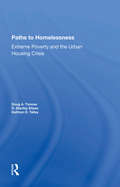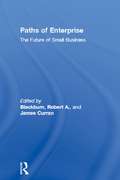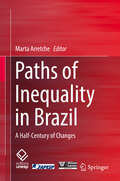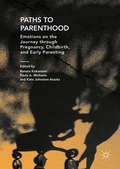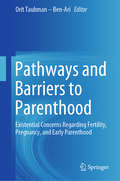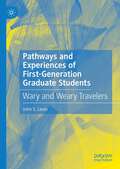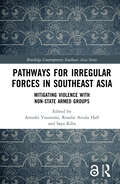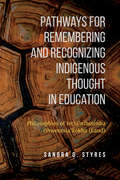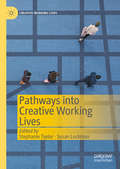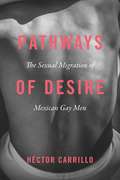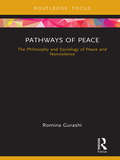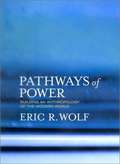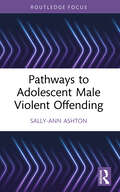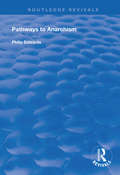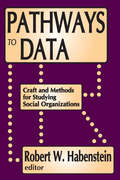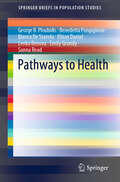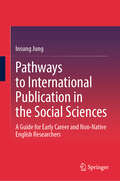- Table View
- List View
Patas arriba, la escuela del mundo al revés
by Eduardo GaleanoHace cientotreinta años, después de visitar el país de las maravillas, Alicia se metió en un espejo para descubrir el mundo al revés. Si Alicia renaciera en nuestros días, no necesitaría atravesar ningún espejo: le bastaría con asomarse a la ventana. Al fin del milenio, el mundo al revés está a la vista: el mundo tal cual es, con la izquierda a la derecha, el ombligo a la espalda y la cabeza en los pies.
Patchwork Leviathan: Pockets of Bureaucratic Effectiveness in Developing States
by Erin Metz McDonnellCorruption and ineffectiveness are often expected of public servants in developing countries. However, some groups within these states are distinctly more effective and public oriented than the rest. Why? Patchwork Leviathan explains how a few spectacularly effective state organizations manage to thrive amid general institutional weakness and succeed against impressive odds. Drawing on the Hobbesian image of the state as Leviathan, Erin Metz McDonnell argues that many seemingly weak states actually have a wide range of administrative capacities. Such states are in fact patchworks sewn loosely together from scarce resources into the semblance of unity.McDonnell demonstrates that when the human, cognitive, and material resources of bureaucracy are rare, it is critically important how they are distributed. Too often, scarce bureaucratic resources are scattered throughout the state, yielding little effect. McDonnell reveals how a sufficient concentration of resources clustered within particular pockets of a state can be transformative, enabling distinctively effective organizations to emerge from a sea of ineffectiveness.Patchwork Leviathan offers a comprehensive analysis of successful statecraft in institutionally challenging environments, drawing on cases from contemporary Ghana and Nigeria, mid-twentieth-century Kenya and Brazil, and China in the early twentieth century. Based on nearly two years of pioneering fieldwork in West Africa, this incisive book explains how these highly effective pockets differ from the Western bureaucracies on which so much state and organizational theory is based, providing a fresh answer to why well-funded global capacity-building reforms fail—and how they can do better.
Patent Law for Computer Scientists
by Jörg Machek Daniel Closa Alex Gardiner Falk GiemsaPatent laws are different in many countries, and inventors are sometimes at a loss to understand which basic requirements should be satisfied if an invention is to be granted a patent. This is particularly true for inventions implemented on a computer. While roughly a third of all applications (and granted patents) relate, in one way or another, to a computer, applications where the innovation mainly resides in software or in a business method are treated differently by the major patent offices in the US (USPTO), Japan (JPO), and Europe (EPO). The authors start with a thorough introduction into patent laws and practices, as well as in related intellectual property rights, which also explains the procedures at the USPTO, JPO and EPO and, in particular, the peculiarities in the treatment of applications centering on software or computers. Based on this theoretical description, next they present in a very structured way a huge set of case studies from different areas like business methods, databases, graphical user interfaces, digital rights management, and many more. Each set starts with a rather short description and claim of the "invention", then explains the arguments a legal examiner will probably have, and eventually refines the description step by step, until all the reservations are resolved. All of these case studies are based on real-world examples, and will thus give an inexperienced developer an idea about the required level of detail and description he will have to provide. Together, Closa, Gardiner, Giemsa and Machek have more than 70 years experience in the patent business. With their academic background in physics, electronic engineering, and computer science, they know about both the legal and the subject-based subtleties of computer-based inventions. With this book, they provide a guide to a patent examiner's way of thinking in a clear and systematic manner, helping to prepare the first steps towards a successful patent application.
Paternalism Beyond Borders
by Barnett Michael N.Nearly all of those who want to make the world a better place are engaged in paternalism. This book asks how power is intertwined with practices of global compassion. It argues that the concept of paternalism illuminates how care and control are involved in the everyday practices of humanitarianism, human rights, development and other projects designed to improve the lives of others. The authors explore whether and how the paternalism of the nineteenth century differs from the paternalism of today, and offer a provocative look at the power in global ethics, raising the question of whether, when, and how paternalism can be justified.
Path to Zero: Dialogues on Nuclear Dangers
by David Krieger Richard A. FalkThe Path to Zero argues that it is time to re-open the public debate on nuclear weapons. In a series of clear and well-reasoned dialogues, long-time scholars and peace activists Richard Falk and David Krieger probe key questions about our nuclear capability and dig beneath the secrecy that has largely surrounded its existence. Falk and Krieger argue that Hiroshima and Nagasaki were only the beginning. In recent times, nuclear annihilation at the hands of rogue states and terrorists has become an even greater concern than the spectre of nuclear war between superpowers. The Path to Zero argues that whilst none of us has the power to bring about global change alone, together we are immensely powerful - powerful enough to overcome the threats of the Nuclear Age and move us appreciably along 'the path to zero'.
Pathologies of Modern Space: Empty Space, Urban Anxiety, and the Recovery of the Public Self
by Kathryn MilunPathologies of Modern Space traces the rise of agoraphobia and ties its astonishing growth to the emergence of urban modernity. In contrast to traditional medical conceptions of the disorder, Kathryn Milun shows that this anxiety is closely related to the emergence of "empty urban space": homogenous space, such as malls and parking lots, stripped of memory and tactile features. Pathologies of Modern Space is a compelling cultural analysis of the history of medical treatments for agoraphobia and what they can tell us about the normative expectations for the public self in the modern city.
Pathologies of Power: Health, Human Rights, and the New War on the Poor
by Paul FarmerPathologies of Power uses harrowing stories of life--and death--in extreme situations to interrogate our understanding of human rights. Paul Farmer, a physician and anthropologist with twenty years of experience working in Haiti, Peru, and Russia, argues that promoting the social and economic rights of the world's poor is the most important human rights struggle of our times. With passionate eyewitness accounts from the prisons of Russia and the beleaguered villages of Haiti and Chiapas, this book links the lived experiences of individual victims to a broader analysis of structural violence. Farmer challenges conventional thinking within human rights circles and exposes the relationships between political and economic injustice, on one hand, and the suffering and illness of the powerless, on the other. Farmer shows that the same social forces that give rise to epidemic diseases such as HIV and tuberculosis also sculpt risk for human rights violations. He illustrates the ways that racism and gender inequality in the United States are embodied as disease and death. Yet this book is far from a hopeless inventory of abuse. Farmer's disturbing examples are linked to a guarded optimism that new medical and social technologies will develop in tandem with a more informed sense of social justice. Otherwise, he concludes, we will be guilty of managing social inequality rather than addressing structural violence. Farmer's urgent plea to think about human rights in the context of global public health and to consider critical issues of quality and access for the world's poor should be of fundamental concern to a world characterized by the bizarre proximity of surfeit and suffering.
Pathology Diagnosis and Social Research: New Applications and Explorations (Political Philosophy and Public Purpose)
by Neal HarrisThe diagnosis of social pathologies has long been a central concern for social researchers working within, and on the peripheries of, Critical Theory. As this volume will elaborate, the pathology diagnosing imagination enables a “thicker” form of social critique, fostering research that pushes beyond the parameters of liberal social and political thought. Faced with impending climatic catastrophe, the accelerating inequities of neoliberalism, the ascent of authoritarian movements globally, and one-dimensional computational modes of thought, a viable form of normative social critique is now more important than ever. The central aim of this volume is thus to champion the pathology diagnosing imagination as a vehicle for conducting such timely social criticism.
Paths To Homelessness: Extreme Poverty And The Urban Housing Crisis
by D. Stanley Eitzen Doug A Timmer Kathryn D. Talley D Stanley EitzenThe major theme in this book is that people are homeless because of structural arrangements and trends that result in extreme impoverishment and a shortage of affordable housing in U.S. cities. It explains the economic and historical causes of homelessness with accounts of individuals and families.
Paths of Enterprise: The Future of Small Business (Social Analysis)
by James Curran Robert A. BlackburnWhile small scale enterprise has expanded rapidly in recent years the way ahead looks uncertain. Drawing together recent research and thinking on small business activities from several disciplines, this book gives a comprehensive picture of the current situation and assesses the future. It evaluates the impact of such diverse influences as technological innovation, demogrpahic change, changes in orgh environment, women and entreprenuership, and by analysing trends in employment levels, banking policies and government schemes it explores ways to survive in an increasingly hostile environment.
Paths of Inequality in Brazil: A Half-Century of Changes
by Marta ArretcheThis book presents multidisciplinary analyses of the historical trajectories of social and economic inequalities in Brazil over the last 50 years. As one of the most unequal countries in the world, Brazil has always been an important case study for scholars interested in inequality research, but in the last few decades has brought a new phenomenon to renew researchers’ interest in the country. While the majority of democracies in the developed world have witnessed an increase in income inequality from the 1970s on, Brazil has followed the opposite path, registering a significant reduction of income inequality over the last 30 years. Bringing together studies carried out by experts from different areas, such as economists, sociologists, demographers and political scientists, this volume presents insights based on rigorous analyses of statistical data in an effort to explain the long term changes in social and economic inequalities in Brazil. The book adopts a multidisciplinary approach, analyzing the relations between income inequality and different dimensions of social life, such as education, health, political participation, public policies, demographics and labor market. All of this makes Paths of Inequality in Brazil – A Half-Century of Change a very valuable resource for social scientists interested in inequality research in general, and especially for sociologists, political scientists and economists interested in the social and economic changes that Brazil went through over the last two decades.
Paths to Parenthood: Emotions on the Journey through Pregnancy, Childbirth, and Early Parenting
by Renata Kokanović Paula A. Michaels Kate Johnston-AtaataThis interdisciplinary book explores the affective dimensions of becoming a parent, traversing the life-cycle journey of pregnancy, childbirth, and early parenting. Bringing together researchers from sociology, history, feminist studies, cultural studies, general medicine, and psychiatry, Paths to Parenthood analyses rich narratives that represent a diverse cross-section of parents, including migrants, same-sex couples, and single parents.
Pathways and Barriers to Parenthood: Existential Concerns Regarding Fertility, Pregnancy, and Early Parenthood
by Orit Taubman – Ben-AriThis volume explores the transition to parenthood from a holistic developmental approach, relating to barriers such as fertility problems and traumatic childbirth, as well as pathways such as positive experiences of pregnancy and childbirth. It presents an extended process, beginning with infertility issues, continuing with subjects pertaining to decisions regarding parenthood, pregnancy and birth, and ending with the early stages of parenthood from a positive psychology perspective. The volume draws on theories of resilience, meaning, terror management, and attachment, and considers psychological, sociological, legal, policy, medical, and therapy issues. It relates to the developmental needs of individuals and couples, as well as to the role played by family, society, and the media, offering a comprehensive in-depth evaluation of the latest topics.
Pathways and Experiences of First-Generation Graduate Students: Wary and Weary Travelers
by John S. LevinThis book focuses on first-generation graduate students in the US and the graduate or post-baccalaureate programs that house and educate these students. The several voices in this book, including first-generation graduate students, address the phenomena of graduate students’ experiences and related university practices, with the practices connected to traditional academic and Western values and to academic and neoliberal institutional logics. First-generation graduate students’ narratives, or testimonies, serve as the foundation of the analysis of students’ pathways to graduate school and their experiences within graduate school. The conditions for first-generation graduate students in their programs require remedies that will facilitate student well-being, peer community attachment, and persistence, and will educate and train students for achievement in graduate school and for employment after graduate school.
Pathways for Irregular Forces in Southeast Asia: Mitigating Violence with Non-State Armed Groups (Routledge Contemporary Southeast Asia Series)
by Atsushi Yasutomi, Rosalie Arcala Hall and Saya KibaAn exploration of the roles that pro- and anti-government militias, private armed groups, vigilantes, and gangs play in local communities in the new democracies of Southeast Asia. Scholars have typically characterized irregular forces as spoilers and infiltrators in post-conflict peacebuilding processes. The contributors to this book challenge this conventional understanding of irregular forces in Southeast Asia, demonstrating that they often attract solid support from civilians and can be major contributors to the building of local security — a process by which local residents, in the absence of an effective police force, develop, partner or are at least included in the management of community crimes and other violence. They analyze irregular forces’ dealings with political actors at the community level, explaining why and how forces are incorporated in and collaborate with legitimate institutions without using violence against them. Offering a new approach to dealing with irregular forces in Southeast Asia, contributors explore new theoretical frameworks that are better suited for evaluating irregular forces’ relationship to different security providers and the political environments in the region. Specifically, they examine case studies from Indonesia, Timor-Leste, the Philippines, and Thailand. A valuable resource for researchers, students and practitioners in the areas of conflict resolution, peacebuilding, and security governance, especially those with a focus on Southeast Asia. This book will also be of great interest to scholars of the sociology and anthropology of the region.
Pathways for Remembering and Recognizing Indigenous Thought in Education: Philosophies of Iethi'nihstenha Ohwentsia'kekha (Land)
by Sandra StyresIndigenous scholars have been gathering, speaking, and writing about Indigenous knowledge for decades. These knowledges are grounded in ancient traditions and very old pedagogies that have been woven with the tangled strings and chipped beads of colonial relations. Pathways for Remembering and Recognizing Indigenous Thought in Education is an exploration into some of the shared cross-cultural themes that inform and shape Indigenous thought and Indigenous educational philosophy. These philosophies generate tensions, challenges, and contradictions that can become very tangled and messy when considered within the context of current educational systems that reinforce colonial power relations. Sandra D. Styres shows how Indigenous thought can inform decolonizing approaches in education as well as the possibilities for truly transformative teaching practices. This book offers new pathways for remembering, conceptualizing and understanding these ancient knowledges and philosophies within a twenty-first century educational context.
Pathways into Creative Working Lives (Creative Working Lives)
by Stephanie Taylor Susan LuckmanThis book presents research on pathways into creative work. The promise of ‘doing what you love’ continues to attract new entrants to the cultural and creative industries. Is that promise betrayed by the realities of pathways into creative work, or does a creative identification offer new personal and professional possibilities in the precarious contexts of contemporary work and employment? Two decades into the 21st century, aspiring creative workers undertake training and higher education courses in increasing numbers. Some attempt to convert personal enthusiasms and amateur activities into income-earning careers. To manage the uncertainties of self-employment, workers may utilise skills developed in other occupations, even developing timely new forms of collective organisation. The collection explores the experience of creative career entrants in numerous national contexts, including Australia, Belgium, China, Ireland, Italy, Finland, the Netherlands, Russia, the US and the UK. Chapters investigate the transitions of new workers and the obstacles they encounter on creative pathways.Chapters 1, 12 and 15 are available open access under a Creative Commons Attribution 4.0 International License via link.springer.com.
Pathways of Desire: The Sexual Migration of Mexican Gay Men
by Héctor CarrilloWith Pathways of Desire, Héctor Carrillo brings us into the lives of Mexican gay men who have left their home country to pursue greater sexual autonomy and sexual freedom in the United States. The groundbreaking ethnographic study brings our attention to the full arc of these men’s migration experiences, from their upbringing in Mexican cities and towns, to their cross-border journeys, to their incorporation into urban gay communities in American cities, and their sexual and romantic relationships with American men. These men’s diverse and fascinating stories demonstrate the intertwining of sexual, economic, and familial motivations for migration. Further, Carrillo shows that sexual globalization must be regarded as a bidirectional, albeit uneven, process of exchange between countries in the global north and the global south. With this approach, Carrillo challenges the view that gay men from countries like Mexico would logically want to migrate to a “more sexually enlightened” country like the United States—a partial and limited understanding, given the dynamic character of sexuality in countries such as Mexico, which are becoming more accepting of sexual diversity. Pathways of Desire also provides a helpful analytical framework for the simultaneous consideration of structural and cultural factors in social scientific studies of sexuality. Carrillo explains the patterns of cross-cultural interaction that sexual migration generates and—at the most practical level—shows how the intricacies of cross-cultural sexual and romantic relations may affect the sexual health and HIV risk of transnational immigrant populations.
Pathways of Peace: The Philosophy and Sociology of Peace and Nonviolence
by Romina GurashiThis book explores the close interconnection that exists between sociological and philosophical scholarship in relation to peace studies. Through an examination of the thought of nine leading philosophers and sociologists in their historical and geographical context, the author considers notions of nonviolent resistance, pacifism and reverse strike, as well as violence theories of conflict, theories of conflict resolution, the problem of war, and political transitions towards democratization. Engaging with the work of Thoreau, Gandhi, Ghaffar Khan, Capitini, Dolci, Bobbio, Galtung, Sharp and Weil, and considering the institutionalisation of peace research, this volume will appeal to scholars and students of sociology, politics and philosophy with interest in peace and security studies, and conflict.
Pathways of Power: Building an Anthropology of the Modern World
by Eric R. WolfPosthumous collection of one of the world's leading anthropologists, spanning well over half a century of scholarship and including both well-known pieces, lesser-known not-easily-accessible pieces, and a few entirely unpublished pieces.
Pathways to Adolescent Male Violent Offending (Routledge Studies in Criminal Behaviour)
by Sally - AshtonThis book differentiates between categories of adolescent male offending and explores the behavioural and social profiles of those who become involved inviolent offending and organized crime. Using self-reported and arrest data, the book examines the key stages of male adolescent offending with a view to early recognition of behaviours that leave young men vulnerable to criminal exploitation and the escalation of violence. It also explains the importance of understanding crime motivations, how young men view themselves when they offend, and the emotions that they experience. Rather than looking at violent offending as a single category of behavior, the book helps readers differentiate between types of adolescent violence and understand the underlying psychological and social causes. It offers an insight into the journey of young people who are criminally exploited and those who become involved in committing acts of serious violence and organized crime. It does so by using data from official records, self-reported offending, and the narratives of young people. Each chapter focuses on a particular stage of offending with a view to early identification, support, and diversion. Pathways to Adolescent Male Violent Offending is aimed at practitioners in youth offending services, youth work, policing, and education. It will also be useful for students of forensic and investigative psychology, criminal justice, policing, and child and adolescent mental health.
Pathways to Anarchism (Routledge Revivals)
by Philip EdwardsFirst published in 1997, this volume challenges the belief that possessive individualists need states to restrain them from trespassing on the natural rights of others or from harming themselves and questions whether anarchy can be sustained to accommodate the long-term self-interests of possessive individualists. Issues discussed include Hobbes’ response to the Foole, Libertarian Anarchism and the inevitability of a minimal state in anarchist society, along with tactics to avoid large wealth differentials.
Pathways to Data: Craft and Methods for Studying Social Organizations
by Robert W. Habenstein"It is much better," observed C. Wright Mills in an essay on intellectual craftsmanship, "to have one account by a working student of how he is going about his work than a dozen 'codifications of procedure' by specialists who often as not have never done much work of consequence." This observation underscores the premise of this book: that there is a need for students to communicate the procedures and strategies of field research they have found consequential in their own studies to the less instructed or less experienced. The contributors to this book are well known researchers and share their field-developed techniques of research craftsmanship. The pathways to data they describe wind in a common direction, toward a concern with research happenings in situations: in agencies, associations, institutions, campaigns, demonstrations, and goal-directed social movements.The selections included in "Pathways to Data" are neither biographies of research projects nor subjective evaluations of personal experiences. Rather, the writers emphasize techniques, operations, and know-how. "Pathways to Data's" chapters are collateral cousins to the collection of research biographies found in "Sociologists at Work", another classic in the field. But the lineage, or progression of thought, traces back to the Webbs' Methods of Social Study, and is most closely related to the Glaser and Strauss volume, "The Discovery of Grounded Theory".The contributors to this book reflect a common concern with organization in the "down home" sense of social bonds opening and closing, of self-involvement, and most importantly social structure. Process is stressed above system, becoming over being. Seen programatically, field methods deliver data to concepts, and techniques are grounded in the heuristic value such data display. Theory is grounded in concepts validated by the effectiveness with which they give meaning to the data. The production of social knowledge is symmetrical, reciprocal, but analytically divisible. The student of society will consequently find an assortment of knowledges that makes large portions of our society more understandable.
Pathways to Health (SpringerBriefs in Population Studies)
by George B. Ploubidis Benedetta Pongiglione Bianca De Stavola Rhian Daniel Lenka Benova Emily Grundy Sanna ReadThis book presents a rigorous enquiry into life course processes that are thought to influence health, integrating the latest methodologies for the study of pathways that link socio-demographic circumstances to health with an emphasis on the mediating factors that lie on these pathways. Following an introductory chapter on the application of formal mediation methods within the life course framework, the book offers insights on the pathways that link early life socio-economic circumstances to physical activity in later life, the role of physical activity as a moderator and/or mediator of the association between fertility history and later life health and the evolution of self-rated health over the life course in two generations born 12 years apart in 20th century Britain. Pathways to Health presents a dynamic view on how to investigate specific hypotheses within the life course framework and enhances the ability of the social science community to investigate specific mechanisms related to public health interventions.
Pathways to International Publication in the Social Sciences: A Guide for Early Career and Non-Native English Researchers
by Insung JungThis guide offers a clear step-by-step approach for graduate students and early-career researchers, especially non-native English speakers, seeking to publish in international journals in the social sciences. It provides practical strategies for preparing, submitting, and refining research papers, helping researchers navigate the challenges of academic publishing. With 21 chapters, the guide covers every stage of writing, revising, and submission, while addressing the unique obstacles faced by non-native English speakers. The guide helps researchers identify reputable journals, avoid predatory ones, and use digital tools to meet international standards. It then provides a structured roadmap that simplifies the publication process, covering steps like journal selection, writing compelling abstracts, and drafting the methods and results sections. By the end of the guide, it is expected that researchers will have a strong first draft or, ideally, a submission-ready manuscript. The guide also addresses language barriers, cultural differences, and unfamiliarity with international conventions. It offers practical solutions for improving English writing, utilizing digital tools, responding to peer reviews, and managing revisions effectively. It emphasizes ethical guidelines like avoiding plagiarism, properly crediting co-authors, and ensuring research transparency to help researchers meet global standards. Unlike other research guides, this one is specifically tailored to early career and non-native English researchers working in social science disciplines. It offers practical strategies and real-world examples to equip researchers—and teachers of research methods and academic writing—with a framework for achieving publishing success in global academia.




